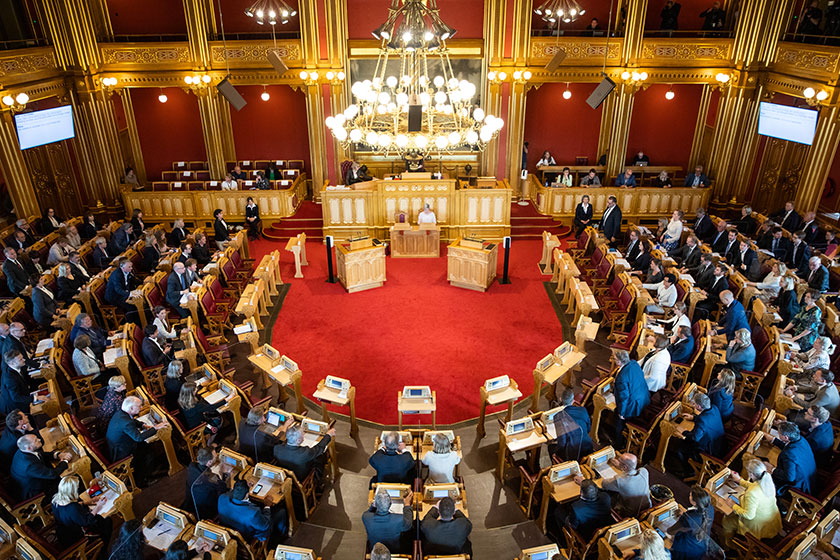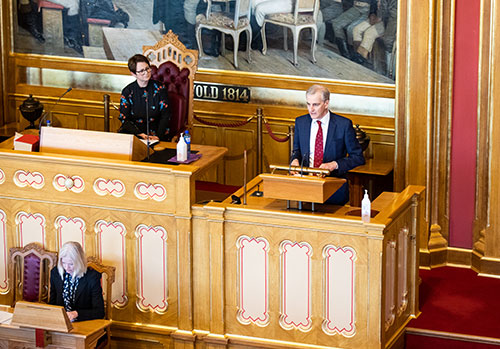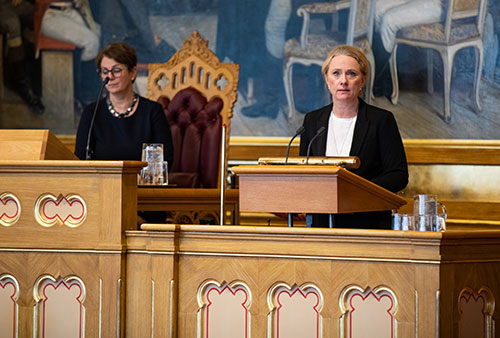
Voting on amendments to the Biotechnology Act on 26th May 2020. Photo: Storting.
Key business during the 2019-2020 session
The 2019-2020 parliamentary year ends on 30th September. Here is a summary of the most important business that the Storting has dealt with so far this session.
Legislation
The Storting considered proposed amendments to various pieces of legislation during the 2019-2020 parliamentary year. Here is a list of some of the most important enactments.
- Changes to the National Insurance Act – requirement of abode and residence in Norway to qualify for spouse and child supplement
- Changes to the Norwegian Nationality Act, including withdrawal of citizenship in the event of giving false information
- Changes to the Broadcasting Act, including an end to the licence fee
- Changes to the Police Act, including armed police patrols around critical public buildings and areas
- Changes to the Immigration Act, including compulsory DNA testing and the potential to exclude host families from the au pair scheme
- Changes to the Alcohol Act, including the adjustment of the Wine Monopoly’s opening hours
- Changes to the Biotechnology Act, including egg donation and assisted reproduction for singles
White papers
White papers – or Reports to the Storting as they are officially called – are reports from the Government to the Storting about work that has been done or the consideration of future policy. White papers often provide the basis for forthcoming government bills and parliamentary resolutions. Among the business dealt with by the Storting between October 2019 and June 2020 were government white papers on:
- Nordic cooperation
- the health industry
- arms exports from Norway in 2018, export controls and international non-proliferation collaboration
- the regulation of pensions in 2019 and pensioner income conditions
- Sami language, culture and society
- the fishing quota system
- the national health and hospital plan 2020-2023
- the Norwegian space industry
COVID-19

Jonas Gahr Støre (Labour Party) speaking during the Corona Bill debate on Saturday 21st March. Mr Støre was the committee spokesperson on this issue. Photo: Storting.
Since early March 2020, the work of the Storting has been dominated by the coronavirus pandemic. On 11th March, the Presidium made the decision to cancel all face-to-face committee hearings and to replace them with a combination of written submissions and videoconference hearings. By that point, all committee travel abroad had been suspended, and domestic committee trips were soon to follow.
At the same time, all group and school visits were suspended, and larger events such as conferences and seminars were cancelled or postponed. Access to the Storting’s public gallery was for limited numbers only.
“In the time ahead, the Storting will only consider matters in which it is absolutely necessary that the Storting makes an immediate decision,” said Tone W. Trøen, President of the Storting, after a meeting between the Presidium and the parliamentary leaders on 12th March. Normal core parliamentary activities were resumed as far as possible after Easter.
On 16th March, the Storting made the decision to appoint a special committee with the remit to consider matters of direct relevance to the coronavirus crisis. The Coronavirus Special Committee dealt with the new temporary legislation that was designed to mitigate the consequences of the coronavirus pandemic as well as the proposal to extend the legislation in April.
The Corona Act was unanimously adopted by the Storting after a first reading on 21st March and a second reading three days later. It was initially passed for the duration of one month, but was later extended for another month. It was repealed on 27th May.
The Corona Act gave the Government the authority to add to or depart from certain legislation. A minimum of one-third of the MPs could stop all or parts of a regulation before it came into force if they submitted a written declaration to the Presidium within 24 hours.
During the spring of 2020, the Storting amended several pieces of legislation on a temporary basis in order to meet needs relating to the COVID-19 crisis.
The Storting also passed major economic crisis measures in response to the consequences of the COVID-19 pandemic. Among these were several financial support packages for businesses, as well as a wide variety of other measures. The first economic measures relating to COVID-19 were passed on 16th, 19th and 21st March.

Anniken Hauglie (Conservative Party), then Minister of Labour and Social Affairs, addressing the Storting on how Norway had practised the EU’s social security regulation, 5th November 2019. Photo: Storting.
Other key issues
In the autumn of 2019, the “NAV affair” hit the headlines. It had become apparent that many social security beneficiaries had been wrongly convicted of benefit fraud due to a misinterpretation of the EEA regulations. Anniken Hauglie, the then Minster of Labour and Social Affairs, addressed the Storting on how Norway had practised the EU’s social security regulation. The Red Party tabled a motion of no-confidence in the minister, but when the Storting voted over it on 27th November, the motion received only one vote. Torbjørn Røe Isaksen took over as Minster of Labour and Social Affairs on 24th January 2020.
The Standing Committee on Scrutiny and Constitutional Affairs was given the responsibility of dealing with the matter. Its recommendation was voted over on 10th March 2020. The committee was unanimous in its view that the serious misinterpretation and practice of the rules has had severe consequences for many people, but the Government escaped censure.
In other business, NorthConnect, a planned interconnector for electricity between Scotland and Norway, was the subject of a private member’s motion and debates in the Storting until the Government put the issue on hold this spring.
The Storting considered a series of constitutional amendments on 14th May. Four of these achieved the three-quarters majority necessary to amend the Constitution.
New voting procedures in the Storting
The 2019-2020 saw the introduction of new voting procedures in the Storting. As a rule, there are now two set voting times in the Chamber every week: Tuesdays at 15h00 and Thursdays at 14h00.
Change in government
On 24th January 2020, there was a change in government. The Progress Party left the coalition, and a minority Government consisting of the Conservative Party, the Christian Democratic Party and the Liberal Party was formed. Prime Minister Erna Solberg notified the Storting of the new composition of the Government on 28th January.
Private members’ bills and motions
Members of Parliament have the same right to initiate proposals as the Government. A proposal put forward by an MP is called a private member’s bill if its aim is to change the law, and a private member’s motion if it relates to other parliamentary business. There are many such proposals every session.
In general, the majority of private member’s bills and motions are put forward by opposition MPs. Under a majority government, there are limits to what the opposition can hope to achieve in the Storting, but such proposals are an opportunity to flag one’s own policies as an alternative to those of the sitting government.
So far this parliamentary year, 144 private member’s bills and motions have been put forward. This is 42 fewer than in the 2018-2019 session.
Last updated: 09.07.2020 14:53